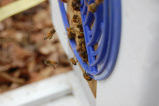|
I often ask school groups the following question "Are honey bees cold-blooded or warm-blooded animals" This is a trick question and the answer is a surprise to most people: they are both cold-blooded and warm-blooded.
As individuals, honey bees are indeed cold-blooded creatures. Their internal temperature fluctuates with the surrounding environment, making them reliant on external sources of warmth or coolness. This cold-bloodedness is a common among all insects, allowing them to conserve energy and adapt to a wide range of temperatures. However, the honey bee story takes an intriguing turn when we consider the hive as a whole unit. Within the hives, honey bees exhibit a remarkable ability to regulate their internal environment, maintaining a constant temperature of around 98 degrees Fahrenheit, regardless of the external conditions. This remarkable feat transforms the honey bee colony into a warm-blooded superorganism. This ability to maintain the temperature is called thermoregulation. The hive's remarkable thermoregulation is achieved through a combination of collective behaviors. When temperatures drop, worker bees huddle together, their vibrating wing muscles generating heat. Conversely, on hot days, bees fan their wings around the hive to circulate air and cool the hive. Cooling is aided by forager bees bringing water into the hive to help create a super air conditioner. Thermoregulation within the hive ensures the survival of the developing brood, which is sensitive to temperature fluctuations. Maintaining a constant temperature also optimizes the working conditions of the hive and allows the bees to keep honey and other materials in a stable state. The dual nature of honey bees as both cold-blooded individuals and a warm-blooded superorganism highlights the remarkable adaptability and resilience of these incredible insects. Their ability to thrive in diverse environments and maintain a stable internal environment is a testament to their complex social structure and collective behavior. So, the next time you encounter a honey bee, remember this fascinating paradox: an individual cold-blooded insect, yet a member of a warm-blooded superorganism. As I write this blog on a cold November morning a hives of our honeybees are generating heat in the super organism hives located in my back field. What incredible creatures they are.
0 Comments
Leave a Reply. |
Details
SEABEE HONEY BLOGAuthorA beekeeper in New Hampshire [email protected] Archives
December 2023
Categories
All
|

 RSS Feed
RSS Feed